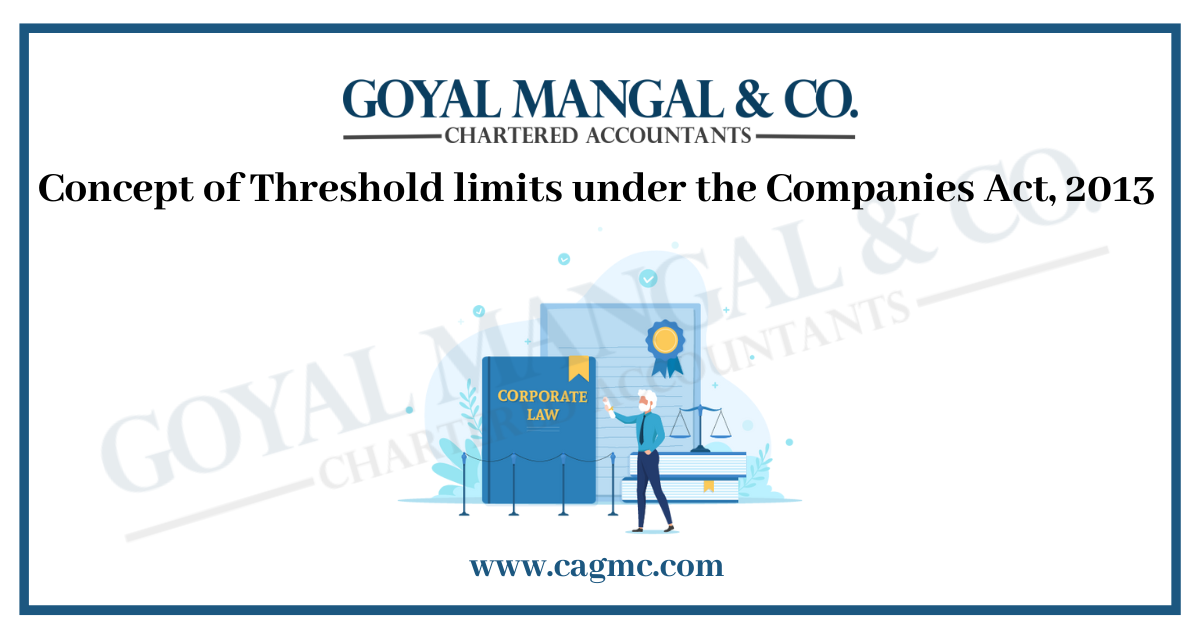 The companies that are created are governed by the Companies Act, 2013 (Act). It lays out some requirements that the corporation must meet. The threshold limits that the Act specifies, determine whether the applicants under the Act must comply with these requirements. The specific corporation must adhere to the clause in question if it falls under the Act’s threshold restrictions, in which case. In this article, we will be discussing Threshold Limits under The Companies Act, 2013. However, it is of utmost importance to have some basic understanding of the types of Companies for we shall move on to discuss the same.
The companies that are created are governed by the Companies Act, 2013 (Act). It lays out some requirements that the corporation must meet. The threshold limits that the Act specifies, determine whether the applicants under the Act must comply with these requirements. The specific corporation must adhere to the clause in question if it falls under the Act’s threshold restrictions, in which case. In this article, we will be discussing Threshold Limits under The Companies Act, 2013. However, it is of utmost importance to have some basic understanding of the types of Companies for we shall move on to discuss the same.
|
Table of Content |
Meaning and Concept of Company
A company is a collection of persons who desire to conduct business after getting legal status. Statutory Companies, One Person Companies, Companies Limited by Shares, a Company Limited by Guarantee, Public Limited Companies, Private Limited Companies, Listed Companies, and Unlisted Companies are all sorts of companies under the Company Act, 2013. Private Companies and Public Companies are the most common of the above-mentioned categories.
- Definition of Company
The term “company” has no technical or legal definition. In general, a company is an association of people for some collective aim or object, and the activities of that association might be varied and involve both commercial and non-economic goals.
A company, according to section 2(20) of the Companies Act, 2013, is “any company established under this Act or any earlier company law.”
For the convenience of our readers understand, we will quickly take a look at different types of Companies that are in connection with the Threshold Limits under the Companies Act, 2013.
Types of Companies under Companies Act, 2013
Following are the types of companies under the Companies Act, 2013, having relation to the threshold limit:
- Private Limited Company
According to Section 2(68) of the Companies Act, 2013, a “private company” is defined as “a business whose articles restrict the power to transfer its shares, if any, and limits the number of its members to fifty.” Furthermore, because the shares are restricted, this sort of company cannot offer them to the broader public.
The fundamental advantage of a private company is that its financials are not made public. Furthermore, they are exclusively accountable to their members/investors.
- Public Limited Company
Section 2(71) of the Companies Act, 2013 defines a public company as one that is listed on a stock market and can sell its securities to the general public. A public company must make its annual report available to all stakeholders and can extend its operations by offering more shares to the general public. Furthermore, a public company must issue an initial public offering (IPO) to the public, and shareholders must be able to freely trade securities on a stock exchange.
- Listed Company
The Companies Act, 2013 defines a listed company as “one whose securities are listed on any recognized stock market.” However, such company that has listed or seeks to list such securities as may be necessary for collaboration with the Securities and Exchange Board is not considered listed companies.”
A listed company is one whose securities are traded on at least one stock exchange. Such a company must adhere to the listing criteria.
- Unlisted Company
Unlisted companies are those that are not publicly traded on a stock market and are thus privately held. They do not have the option to gather donations since they are not on the list. They are transforming into capital investors. The shares are traded “over the counter,” where the parameters of the agreement may be tailored to the needs of the parties involved (buyers and sellers); hence, the exchange of controls is avoided. Unlisted companies have greater autonomy over their operations.
Since, we have now been able to make a distinction between different types of companies under the Companies Act, 2013. Now, we shall move on to discuss Threshold Limits under The Companies Act, 2013.
What are the Provisions that set Threshold limits under the Companies Act, 2013?
The Act’s provisions that set threshold limits include those relating to the following: filing a duly certified annual return by a company secretary, the corporate social responsibility committee, internal auditing, the appointment and reappointment of auditors, the nomination and remuneration committee, the vigil mechanism, key managerial personnel, a full-time company secretary, secretarial audits, and the reporting of balance sheets and statement of financial position in XBRL mode, Nomination and Remuneration Committee, Stakeholders Relationship Committee, Appointment of MD/CEO/Manager /WTD, CS & CFO.
The tabular format of the provision of Threshold limits under the Companies Act, 2013
For the sake of readers a tabular form of the concept of threshold is shown below:
<tdstyle=”border: 1px solid #555;”>
Section 138 and Rule 13
- Listed
- Unlisted
- Public
- Private
Every listed company,
Every unlisted public company having –
- Paid-up share capital of Rs.50 crore or more during the preceding financial year, or
- Turnover of Rs.200 crore or more during the preceding financial year, or
- Outstanding loans or borrowings from banks or from public financial institutions exceeding Rs.100 crore or more at any point time during the preceding financial year, or
- Outstanding deposits of Rs.25 crore or more at any point time during the prior financial year,
Every Private Company has –
- Turnover of Rs.200 crore or more during the preceding financial year, or
- Outstanding loans or borrowings from banks or public financial institutions exceeding Rs.100 crore or more at any point time during the preceding financial year.
| S. No. |
Title | Sections of the Companies Act, 2013 | Applicability | Threshold | |||
| 1. | Small business | Section 2(85) | To private company | PUC – upto Rs.2 Cr TO –Upto Rs.20 Cr |
|||
| 2. | Acceptance of deposits | Section 76 and the central government rules | To public company | NW – Not less than Rs. 100 Cr TO – Not less than Rs. 500 Cr GM – Special resolution | |||
| 3. | Annual Return | Section 92(2) & Rule 11(2) of Chapter VII – Companies (Management and Administration) Rules, 2014 | 1. Listed
2. Public 3. Private |
All Listed Companies and Companies with a paid-Up share capital of 10 Crore or more or with a turnover of 50 Crore rupees or more | |||
| 4. | Formal annual Evaluation | Section 134(3)(p) & Rule 8(4) | 1. Listed
2. Public |
Every Listed Company and PUC– Rs. 25 Cr or more | |||
| 5. | Corporate Social Responsibility Committee | Section 135 of Companies Act, 2013 | Every company | 1. Every company having a total amount of rupees 500 Crore or more;
2. Every company with a turnover of rupees 1000 crore or more; 3. Every company with a net profit of rupees 5 crores or more; during the preceding financial year. |
|||
| 6. | XBRL | Section 137 and Rule 3 | 1. Listed & its Indian Subsidiaries
2. All Companies |
1. Companies that fall under the list of Stock Exchange in India.
2. Company’s subsidiaries are listed on any Stock Exchange in India. 3. Companies that have paid up Share Capital of Rs. 5 Crore and above. 4. Companies with a turnover of Rupees 100 Crore and above. |
|||
| 7. | Internal auditor | ||||||
| 8. | Appointment of Auditors (Term-wise) | Section 139 and Rule 5 of Chapter X – Companies (Audit and Auditors) Rules, 2014 |
|
1. All listed companies, or
2. Every unlisted public company having paid-up share capital of Rs.10 crore or more, or 3. All private limited companies having paid-up share capital of Rs.20 crore or more, or 4. Every company which has borrowed from financial institutions, banks, or public deposits of Rs.50 crore or more. |
|||
| 9. | Women Director | Section 149 of Companies Act, 2013 read with Rule 3 of Chapter XI – Companies (Appointment and Qualification of Directors) Rules, 2014 |
|
1. All listed companies
2. Every Public Organization is having a Paid-Up Share Capital of Rs. 100 Crore or more; or 3. Every Public Organization is having a turnover of Rs. 300 Crore or more |
|||
| 10. | Independent director | Section 149 of the Companies Act read with Rule 4 of Chapter XI – Companies (Appointment and Qualification of Directors) Rules, 2014 |
|
1. All listed companies
2. Public Companies that can afford Paid Up Share capital of Rs. 10 Crore or more (AT LEAST 2 INDEPENDENT DIRECTOR) 3. Public Companies have a turnover of Rs. 100 Crore or more (AT LEAST 2 INDEPENDENT DIRECTOR) 4. The Public Organizations which have, in total, exceptional advances, debentures, and deposits, exceeding Rs. 50 Crore. |
|||
| 11 | Vigil Mechanism | Section 177 of the Companies Act read with Rule 7 of Chapter XII – Companies (Meetings of Board and its Powers) Rules, 2014 |
|
1. All listed companies
2. The company accepts deposits from the general public; 3. The companies that already have taken money from banks and public financial institutions in excess of Rs. 50 crores |
|||
| 12. | Audit Committee | According to Section 177 of Companies Act, 2013 read with Rule 6 Chapter XII, Companies (Meetings of Board and its Powers) Rules |
|
1. Every listed company, or
2. Every public company having a paid-up share capital of Rs.10 crore or more, or 3. Every public company having a turnover of Rs.100 crore or more, or 4. Every public company has in aggregate, outstanding loans or borrowings or debentures or deposits exceeding Rs.50 crore or more. |
|||
| 13. | Nomination and Remuneration Committee | Section 177 of Companies Act, 2013 read with Rule 6 of Chapter XII – Companies (Meetings of Board and its Powers) Rules, 20
4\4 |
</td style=”border: 1px solid #555;”> |
1. Every listed company, or
2. Every public company having a paid-up share capital of Rs.10 crore or more, or 3. Every public company having a turnover of Rs.100 crore or more, or 4. Every public company has in aggregate, outstanding loans or borrowings or debentures or deposits exceeding Rs.50 crore or more. |
|||
| 14. | Stakeholders Relationship Committee | Section 178
(5) |
Every Company | A company having more than 1000 security holders | |||
| 15. | Appointment of MD/CEO/Manager /WTD, CS & CFO | Section 203 and Rule 8 |
|
PUC– Rs. 10 Cr or more | |||
| 16. | Appointment of CS | Section 203 and Rule 8A | Private | PUC-Rs. 10 Cr and more | |||
| 17. | Secretarial audit | As per Section 204 (1) of Companies Act, 2013 read with Rule 9 Chapter XIII, Companies (Appointment and Remuneration of Managerial Personnel) Rules, 2014. |
|
Every Public Company has;
Paid-Up Share Capital of Rs. 50 Crore or more; or Every Public Organization is having a turnover of more than Rs. 250 Crore |
Conclusion
These are some of the provisions made as a threshold for the companies. However, there is some compliance that is applicable depending upon the company, its turnover paid-up capital, etc. as mentioned in the table above. Therefore, it is a gist that provides information about the thresholds that various companies have as per the Companies Act, 2013 are obliged to adhere to the norms and fulfill the same to run a company. These thresholds help to increase the systemized working and employment even with more security and benefits.


